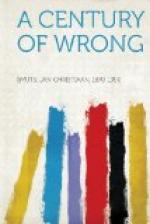That in these last months I have been forced to protest against the attempt to stifle their independence is due to a very simple cause. To seek to reform the Transvaal, even by the rough and ready means of a legitimate revolution, is one thing. To conspire to stifle the Republic in order to add its territory to the Empire is a very different thing. The difference may be illustrated by an instance in our own history. Several years ago I wrote a popular history of the House of Lords, in which I showed, at least to my own satisfaction, that for fifty years our “pig-headed oligarchs”—to borrow a phrase much in favour with the War Party—had inflicted infinite mischief upon the United Kingdom by the way in which they had abused their power to thwart the will of the elected representatives of the people. I am firmly of opinion that our hereditary Chamber has done a thousand times more injury to the subjects of the Queen than President Kruger has ever inflicted upon the aggrieved Uitlanders. I look forward with a certain grim satisfaction to assisting, in the near future, in a semi-revolutionary agitation against the Peers, in which some of our most potent arguments will be those which the War Party has employed to inflame public sentiment against the Boers. But, notwithstanding all this, if a conspiracy of Invincibles were to be formed for the purpose of ending the House of Lords by assassinating its members, or by blowing up the Gilded Chamber and all its occupants with dynamite, I should protest against such an outrage as vehemently as I have protested against the more heinous crime that is now in course of perpetration in South Africa. And the very vehemence with which I had in times past pleaded the cause of the People against the Peers would intensify the earnestness with which I would endeavour to avert the exploitation of a legitimate desire to end the Second Chamber by the unscrupulous conspirators of assassination and of dynamite. Hence it is that I seize every opportunity afforded me of enabling the doomed Dutch to plead their case before the tribunal which has condemned them, virtually unheard.
In introducing A Century of Wrong to the British public, I carefully disassociate myself from assuming any responsibility for all or any of the statements which it contains. My imprimatur was not sought, nor is it extended to the history contained in A Century of Wrong, excepting in so far as relates to its authenticity as an exposition of what our brothers the Boers think of the way in which we have dealt with them for the last hundred years.




